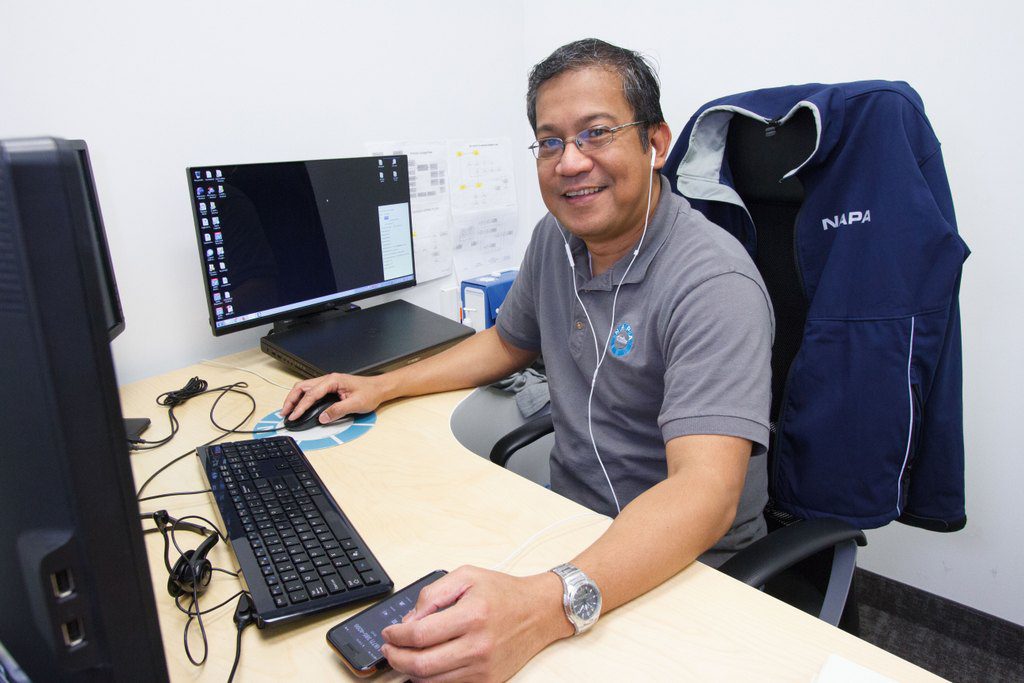February 11, 2022
At the helm with Jose Magdangal, Senior Technical Consultant
As the world’s leading provider of electronic logbooks, NAPA Logbook has more than a decade’s service on board vessels, serving more than 8,000 users and approved by more than 20 major flag states, including the Bahamas, Panama, and Malta. NAPA Logbook has also been certified by DNV for MARPOL related electronic record keeping.
NAPA Logbook is a software application that can be used from any onboard computer. The users can easily search any official logbook event, filter results with keywords, make calculations based on automation signals and check values against boundary conditions.
From an unexpected upturn in innovation collaborations with customers to the day-to-day prioritizing of support efforts, we spoke to Jose Magdangal, Senior Technical Consultant, about life as a Naparian and how he supports innovation using NAPA Logbook.

Tell us a little about your previous experience and what attracted you to take up a position with NAPA?
I joined NAPA in Fort Lauderdale, Florida, after working at sea as an inventory controller and then as Database Administrator shore side for Carnival Cruise Lines for about 15 years. I was looking for a new challenge which I found in NAPA. Since I had experience onboard with NAPA software and was part of the NAPA team on software installations on Carnival vessels, I grabbed the opportunity.
That was nine years ago now, and I couldn’t be happier with my decision. With its company focus on self-management, working at NAPA is very different from the conventional corporate environment. At NAPA, we are all empowered to act independently, and if we want to discuss anything even directly with the President, we can – something that I really appreciate in this role.
What is your current role at NAPA?
As Senior Technical Consultant, much of my time is spent supporting our customers with NAPA Logbook. This includes prioritizing support tasks as well as working on new installation projects, ensuring our customers in the cruise and ferry industry have the best tools and support possible.
Although the pandemic has changed things somewhat, I typically visit customers on a regular, at least monthly, basis. When visiting in person hasn’t been an option, I maintain communication by phone and email. I like to be close to them, get to know them, so I can understand and anticipate their needs.
Has your time spent at sea been of benefit to you at NAPA?
My time at sea has been invaluable to my ability to support our customers – I understand what they are experiencing, and although I don’t have a naval architecture background, I can picture their needs because I’ve been there myself.
Rather than having less demand for my time as cruise ship activity has dropped during the pandemic, I find the opposite has occurred. Shipboard officers have more time to think and review their processes – and more time to make suggestions to NAPA about what they would like to see improve in their processes or software solutions! Again, my time at sea helps me to understand what they need and how we can help.
How do you go one step above to support NAPA’s customers?
In a word – availability. Having worked at sea I know how frustrating it is to have to wait for one or more days to get shoreside support. I make myself available to our customers – they work 24/7 therefore I tried to be on hand as much as I can by quickly acknowledging their correspondence and/or providing solutions or advice as soon as possible.
Can you tell us about a project that you feel has been particularly interesting or challenging?
One of our customers came to me with the idea that they would like to track the status of onboard hotel machinery such as elevators, ovens, laundry machines, etc. – equipment that can have a key impact on customer comfort if something goes wrong. NAPA Logbook was the obvious starting point in meeting this request, but it did take it in a new direction – one that it hadn’t been explicitly designed for. Another challenge was that our customer wanted standardized reporting even though the ships in their fleet were quite different – one might have four ovens, another 20.
We were able to deliver, and the solution is working so well that more equipment is being added to the system. It was initially challenging to consider how we might achieve such a great outcome, but it was worth the effort to now see it in action.
What changes do you see coming over the next few years in how the shipping industry views software support?
Cybersecurity is something I see continuing to grow in importance and therefore in company planning and expenditure. Our software adheres to international standards on cybersecurity, and although at present some companies are just beginning their cybersecurity journey, we are ready for them.
What is your favorite activity to do outside of NAPA?
I love being out in the open air – at the beach or taking a walk in the park with my family.
To find out what it is like to be a Naparian, or to view our open positions, visit NAPA Careers.